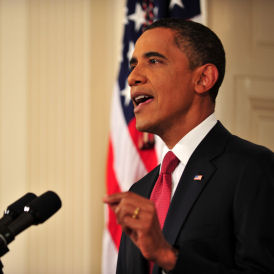Vote on US debt deal
US Congress votes on President Obama’s last-minute deal to raise the US debt limit and avoid crisis. Channel 4 News asks if the delays have done lasting damage to Obama’s reputation.
Republican and Democratic lawmakers are voting on the debt deal. Backed by the White House, it aims to raise the US debt ceiling and avert an unprecedented default.
The provisional agreement has to gain approval from the Senate and the House of Representatives. President Barack Obama has urged both houses to approve the deal, which has taken weeks of to-ing and fro-ing between the political parties and came just a day ahead of the deadline.
The plan involves a two-step process for reducing the deficit. The first phase calls for about $900bn in spending cuts over the next decade and the next $1.5tr in savings must be found by a special congressional committee.

D-Day for the United States Government is 2 August – Tuesday. Without a deal to raise the amount America can borrow by this date, the country will officially be in default, putting spending commitments and its AAA credit rating at risk in what the President said would be a “devastating” outcome for the US economy.
The conclusion is that he [Obama] is someone from whom enemies may gain advantageous deals. Dr Nigel Bowles, US politics expert
But despite the gravity of the situation if a deal were not done, the two sides in American politics have been facing off in what some have called a “macho game of chicken” for weeks, unable to reach agreement. And many feel that it was the President who blinked first, with the compromise more in favour of Republicans than Democrats.
Dr Nigel Bowles, US politics expert at the University of Oxford, told Channel 4 News: “I suspect what his supporters and his enemies – and he has a lot of enemies – will draw from what has happened is that he is someone from whom enemies may gain advantageous deals.
“That is the conclusion that will be drawn. His supporters will draw it with disappointment – but his enemies will draw it with relish.”

Risk for the 2012 elections?
He said this definitely “increased the degree of risk” to Obama’s presidency in the 2012 US elections, but said he still believed Obama was in a “moderately powerful position”, despite his lack of success in resolving an issue which perhaps means more to voters on the ground – America’s 9 per cent unemployment rate.
But he said the Republican party had not come out of the negotiations on top either, mainly because the deal was mainly a sop to their right wing, the Tea Party faction.
“The Republican leadership emerges moderately strong in relation to Obama, but moderately weak in relation to their own right wing, which has shown enormous leverage by simply being unyielding,” he said.
The implications are not over and they are likely to be permanent. Dr Nigel Bowles
But he said on this issue as well as more generally, the Tea Party remained an unappealing prospect to the average American voter preparing for 2012.
“The Republican nominee will emerge from a crowded primary field as a result of accommodating the preferences of Tea Party activists, not the median American voter,” he said.
“Then they’ll have to row back considerably in the general election to persuade the median American voter that they, not President Obama, are to be trusted. So it’s not straightforward.”
Doubts
Regardless of the impact on American politics, Dr Bowles said the fraught negotiations would have a lasting impact on the international community’s perception of the value and security of US debt.
He said the negotiations often came “close to the wire” but said he could not remember there ever being as much doubt over a successful resolution as on this occasion.
“So what has for 200 years been a risk-free asset is plainly not risk-free, and that will affect the price,” he said.
“The implications of this are not over and they are likely to be permanent. Once doubts have been raised they are difficult to dispense with.”